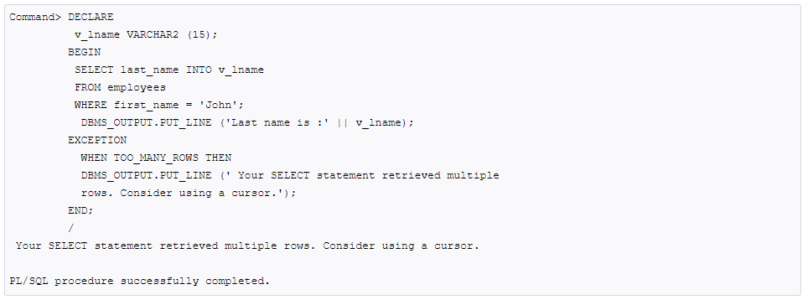Read full review of BookwormHub.com
For both beginners and experienced ones, getting ready for the PL/SQL interview is very important. Being an extension of SQL, PL/SQL requires a good knowledge in procedural programming concepts along with database management techniques. It’s necessary for potential candidates to know about basic blocks, procedures, functions and packages in PL/SQL. In addition, it’s vital to research on the employer of interest as well as job description to ensure preparation is up to date. Through all-round PL/SQL interview preparation though time consuming and involving candidates will come out as people who knows their worth in the competitive market place since they are dynamic enough to adapt easily (Lakshman, 2003). Image: Basic PL/SQL Block example:
Image: Basic PL/SQL Block example:
Beginner-Level PL/SQL Interview Questions
In the world of PL/SQL interviews, some questions can be referred to as fundamental ones which are meant to help evaluate how well a candidate understands basic concepts and applies them suitably. In this connection, there is a discussion about certain common PL/SQL interview questions for elementary level together with their solutions:- What is PL/SQL?
- Differentiate between SQL and PL/SQL.
- Explain PL/SQL blocks.
- What are PL/SQL procedures and functions?
- How do you declare variables in PL/SQL?
 Image: Declaring Variables in PL/SQL
Variables can be used to store and manipulate data within PL/SQL blocks, enabling dynamic behavior in database operations.
Image: Declaring Variables in PL/SQL
Variables can be used to store and manipulate data within PL/SQL blocks, enabling dynamic behavior in database operations.
- Explain PL/SQL data types.
- How do you handle exceptions in PL/SQL?
 You can handle such exceptions in your PL/SQL block so that your program completes successfully. For example:
You can handle such exceptions in your PL/SQL block so that your program completes successfully. For example:

Intermediate Challenges in PL/SQL Interviews
Intermediate level PL/SQL interview questions tend to go further into the depths of procedural programming and database management requiring individuals to show that they have a more sophisticated grasp of PL/SQL concepts and their practicality. Below are some typical challenges at intermediate level in PL/SQL interviews along with their solutions.- Discuss PL/SQL procedures and functions.
- What are PL/SQL packages?
- How do you optimize PL/SQL performance?
- Discuss PL/SQL cursor types and their functionalities.
- Explain PL/SQL exception propagation and error handling strategies.
Advanced PL/SQL Interview Insights
Advanced PL/SQL interview insights go deep into the world of procedural programming, database optimization and other advanced features of PL/SQL. This includes a thorough knowledge on complex PL/SQL ideas as well as the creation of scalable, efficient and maintainable database solutions. Here are some key insights that candidates should be aware of when faced with these queries regarding advanced PL/SQL.- Optimizing PL/SQL Performance with Advanced Techniques
- Utilizing Advanced PL/SQL Features for Complex Business Logic
- Implementing Robust Error Handling and Logging Mechanisms
- Optimizing PL/SQL Code for Maintainability and Extensibility
Key Strategies for Effective Interviews
- Understand the job requirements thoroughly.
- Practice coding and problem-solving.
- Showcase your experience and accomplishments.
Common Mistakes and How to Avoid Them
- Neglecting to test your code.
- Overlooking performance optimization.
Tips for Candidates to Stand Out
- Demonstrate your problem-solving skills.
- Showcase your passion for learning and growth.








